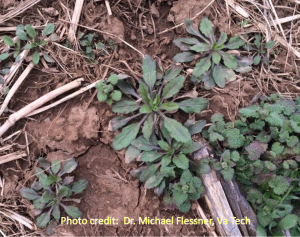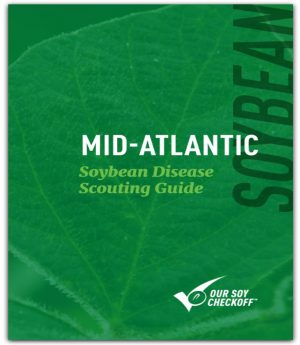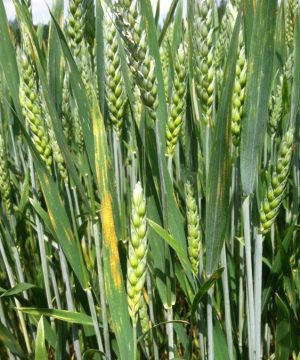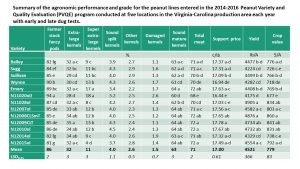Our recent warm weather has done more than wake up your plants – it has signaled to many insects that it is time to start feeding and reproducing. Prompted by a call from ANR agent Mike Parrish in Dinwiddie County, I spoke today with Kathy Flanders at University of Auburn about her recommendations to mitigate insect injury in store grain. Her #1 suggestion – turn on those fans! Your goal should be to keep the temperature inside your bin below 60 degrees. Make sure and leave equipment running long enough to cool the entire structure. If you are unable to keep temperatures below this threshold, or if our nights do not stay cool, make sure to take samples regularly to scout for insect injury. Consult this guide for management recommendations specific to the Southeast: http://www.aces.edu/pubs/docs/I/IPM-0330/IPM-0330.pdf.
Category Archives: Commodity

Scout now for marestail/horseweed
Recent mild temperatures and the mild winter are setting the stage for rapid development of marestail/horseweed (Conyza canadensis) this spring. Marestail was particularly troublesome last year in soybeans. Marestail can germinate in both the fall and the spring. It is more likely to overwinter in the rosette stage during mild winters. If you wait until your typical burndown the marestail may start bolting and therefore be more difficult to control. Adding to this difficulty, many marestail populations are resistant to Roundup (and other glyphosate containing products). You should scout your fields targeted for soybeans now to identify overwintering marestail. Marestail control can be achieved with 2,4-D or dicamba now and still offer plenty of time to avoid plant back restrictions (up to 15 days for 2,4-D or up to 28 days for dicamba). Glyphosate resistant weeds and the difficulty in controlling more mature weeds underscore the need to scout fields earlier and use some alternative herbicides in your program. Always consult the product label for specific instructions.
Planning for Planting Date and Seeding Rate for 2017 Peanut Season in Virginia
There may be more peanut and cotton acreage planted in the V-C region this year than in 2016; and growers may wonder what crop to start planting first and which one last. These are legitimate concerns and we may have, at least in part, answers.
For peanut, mid-May planting seems to carry least risk compared with late April to early May or late May to early June plantings. This is quite common knowledge gathered through extensive research at the Tidewater Agricultural Research and Extension Center in Suffolk VA and Peanut Belt Research Station in Lewiston NC. However, researchers agree that all depends on the weather. For example, research I did in 2009, a relatively cool and wet year with 17 inches of rainfall from May through the end of August, clearly showed that April 20 planting resulted in a statistically significant yield reduction of 780 pounds per acre in comparison with a May 15 planting. At the state level, average yield in Virginia in 2009 was 3700 pounds per acre, similar with the average yield in 2016. Year 2010 was hot and dry with less than an inch precipitation in June, July and August combined. In this year, state average yield was only 1800 pounds per acre and our results indicated that April 15 planting of Bailey resulted in substantially more yield than late May (May 21) planting. The majority of other peanut commercial cultivars tested in that year responded in a similar way; but there were a few exceptions like Sugg, Gregory, and the runner Georgia 09B, which performed well when planted on May 3, but still low when plated on May 21. The first two weeks in May (maybe end of April too with good thrips control) may be best for peanut planting if April and May are warm with constant daily temperatures of 65 °F or more, sunny days, and night temperatures of 45 °F or more, and soil has “right” moisture; if moisture is excessive, the soil is probably cool. If April and May are cool and wet like last year, maybe waiting for after mid-May to plant peanut is the best option. Varieties seem to respond differently to planting time, but information on the new high oleic cultivars needs investigation.
In 2011 and 2012, I looked at how combination of planting date, seeding rate and tillage affects peanut yield. Results from these years were also dependent upon the specific weather conditions of each year. Across the state, both years were “good” years for peanut, with state averages of 4100 and 4200 pounds per acre; but in 2011, the hurricane in August dropped 18 inches of water at one time, and weather was considerably warmer than in 2012. In 2011, planting on April 25, May 5 or May 23 did not significantly changed yield, in particular when 5 or 6 seeds per foot-row were seeded. Some yield reductions were observed when only 3 seeds per foot were used. However, in 2012 Bailey yielded approximately 1000 pounds per acre more when planted on May 12 in comparison with April 30 and May 23 or June 1; and yields were about 100 pounds per acre greater in conventional versus strip till.
We concluded that the optimum time for peanut planting in Virginia is May 5 to May 20. Planting early may have lower yields due to thrips damage, and cool and wet soils; later plantings may also drop yield due to poor germination and crop stand; and recommended increase of seeding rate to 5 or 6 seeds per foot when planting outside this time window. More information on this research is here.

New Mid-Atlantic Soybean Disease Scouting Guide Available
A Mid-Atlantic Soybean Disease Scouting Guide was recently developed by Extension Plant Pathologists from Virginia Tech and the University of Delaware in cooperation with the state Soybean Boards and the Soybean Checkoff. An online version of the guide can be found here:
Mid-Atlantic Soybean Disease Scouting Guide
Hard copies of the guide are available at the Virginia Tech Tidewater AREC, and requests for guides can be sent to Dr. Hillary Mehl (hlmehl@vt.edu). These will also be available at grower meetings and field days in 2017.

Stripe Rust Found in North Carolina Wheat
This week, stripe rust was found in Robeson County, NC. The disease was observed in wheat variety SS 8404 which is susceptible to stripe rust. Current weather conditions (cool, wet) are generally favorable for spread and development of stripe rust, and it will likely move north into Virginia before the end of the wheat growing season. However, stripe rust is typically a problem only in susceptible varieties. With this in mind, it is important for growers to determine which of their planted varieties are susceptible to stripe rust so they will be prepared to scout and apply a fungicide once the disease makes its way to Virginia. One popular variety, Shirley, is very susceptible to stripe rust, and outbreaks of this disease were observed in some fields planted to Shirley in 2016. Stripe rust and other disease ratings for wheat in Virginia can be found in the link below for the VCE Publication Small Grains in 2016. A link to the Diseases in Small Grains chapter from the 2017 Pest Management Guide for Field Crops is also attached. This includes management recommendations and a fungicide efficacy table for stripe rusts and other diseases of wheat. Several different fungicides are available that are rated “Excellent” for stripe rust control, but fungicides are most effective when applied prior to disease development. Thus, if you know you have a variety is that is susceptible to stripe rust you should be scouting those fields and apply a fungicide if stripe rust is observed. There is no need to spray wheat for stripe rust at this time, but it is important to be aware and be prepared. If you suspect you have stripe rust, you can send a photo and/or sample to Dr. Hillary Mehl at the Tidewater AREC (hlmehl@vt.edu).
Small Grains in 2016 (variety disease susceptibility ratings)
Strip versus conventional till for peanut
Research at the North Carolina State University showed that peanut yields were lower when planted on fine-textured soiled in strip tillage in comparison with conventional tillage. Yield reduction appeared to be associated with greater pod loss in the digging process for the strip versus conventional tillage. Use of stale seedbeds, by bedding rows without other tillage operations sometime after the harvest of previous crop and 4 to 6 weeks prior to planting peanut, was further proposed as a tillage practice that could alleviate yield reduction due to strip tillage. Research using corn, cotton and grain sorghum as rotation crops showed that, indeed, depending on year and location peanut yielded greater in stale seedbed and strip tilled land versus just strip-tilled soil. For example, in 2006 at Rocky Mount, NC, when soil was bedded and strip tilled, pod yield was 3620 pounds per acre, significantly more than 2570 pounds per acre when peanut was planted directly into stripped soil and crop stubble. However, similar responses were not observed in 2002 at either Lewiston or Rocky Mount; which probably denotes that more research is needed to document if stale beds in crop stubbles and in strip tillage peanut production work. According with these researchers, peanut yield in longer rotations was higher than yield of shorter rotation, but the rotation crop had no effect. The full article is here peanut-notes-2017-no-23-peanut-strip-tilled-into-grain-sorghum-stubble.
Reminder for the 2017 Mid-Atlantic Strawberry Programs in Virginia Beach
The following is being issued on behalf of Roy Flanagan, Virginia Cooperative Extension ANR Agent, Virginia Beach (meeting information and registration forms can be found on my January 30, 2017 blog). This is a reminder for folks to register if you plan to attend any of the 2017 Mid-Atlantic Strawberry Programs in Virginia Beach. The room block with Fairfield Inns and Suites filled up quickly, we have increased that group of blocked rooms at the special rate of $86 per night. If you tried to register and had issues, please email Roy Flanagan directly and he will get you in touch with the right person to get your room issues taken care of and get the reduced rate.
If you have questions, please contact Roy Flanagan.
Agriculture Extension Agent/ Virginia Beach
Office: 757-385-GROW (4769)
Email: RFlanaga@vbgov.com
Information on the pesticides under European Union scrutiny
The European Union (EU) is reviewing the current maximum residue levels (MRLs) for pesticides, some being used in peanut production. The process started in 2016 and will continue in 2017. As expected, peanut imports in EU may be affected by these changes. I am providing here information on these products (credit David Jordan and American Peanut Council), and I will continue to do so when I have new information. Although under review, please note that not all pesticides may have their MRLs lowered. peanut-notes-2017-no-12-comments-on-pesticides-eu-peanut-imports peanut-notes-2017-no-11-wto-communication-on-pesticides-and-mrls
peanut-notes-2017-no-11-wto-communication-on-pesticides-and-mrls
2017 Mid-Atlantic Strawberry Programs
The following information is posted on behalf of Roy Flanagan, Virginia Cooperative Extension ANR Agent, Virginia Beach. The first attachment (a Word document) includes details on the Mid-Atlantic Strawberry Programs (Feb. 27-Mar. 1, 2017), and the second (a pdf file) is the registration form.
Peanut Variety and Quality Evaluation 2016 Report
Growers in Virginia, North Carolina, and South Carolina are always in need for high yielding, disease resistant and early maturing peanut varieties with good grading and processing quality. The multi-state Peanut Variety and Quality Evaluation (PVQE) program evaluates advanced breeding lines from the North Carolina State University and University of Florida breeding programs that can further be released as Virginia-type cultivars suitable for the region. These lines are compared with the current commercial cultivars, ‘Bailey’, ‘Sugg’, ‘Sullivan’, ‘Wynne’, and ‘Emery’ for yield and quality throughout the production region in Virginia, North Carolina and South Carolina. The 2016 report with the agronomic and grade PVQE data is available here :http: //pubs.ext.vt.edu/AREC/AREC-198/AREC-198.html. A summary of the 2014-2016 agronomic and grade performance is presented in the table below. In average of 3 years and five locations each year, ‘Bailey’ produced 4,477 pounds per acre and the crop value was 776 dollars per acre. Some of the new lines, however, significantly exceeded ‘Bailey’ for both pod yield and crop value; lines N11028ol and N12008CLSmT in particular. Unlike ‘Bailey’, which has normal oil chemistry, all the breeding lines tested recently in the PVQE program are high oleic. This means they have over 75% of their oil content made of oleic fatty acid; and this characteristic extends the freshness and shelf life of the peanuts from 4 to 32 weeks.

